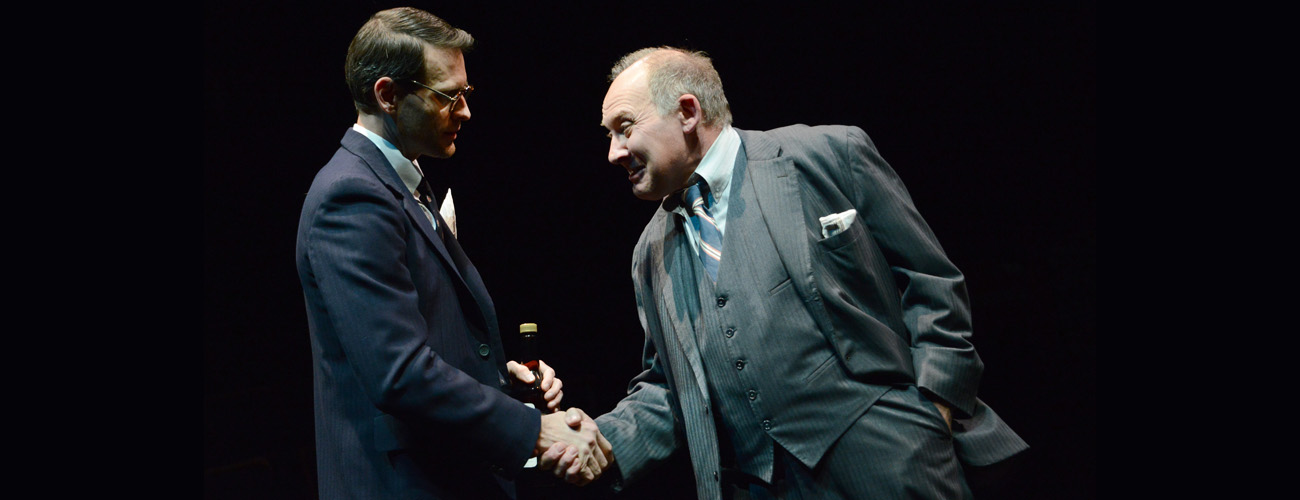Review: Death of a Salesman, starring Zach Grenier, at the O'Reilly Theater (Pittsburgh)

Most of the works of fiction and theater that are closest to my heart are those that I read or saw first in my high school years. Not sure why this is, except that I had a couple outstanding literature teachers at the Linsly School -- specific shout-outs to Mssrs. Robert Hunter and Robert Fisher -- who breathed life into such American classics like Death of a Salesman at a time when my mind was more supple and impressionable than it is now and (perhaps more importantly) I had more time to pore over works of literature and absorb them. For this reason I have always had a soft spot for Death of a Salesman, by Arthur Miller...and also because it's a fantastic play.
What's amazing when you go back and re-read or re-watch something that you were first exposed to as a teenager is how differently it resonates with you. Reading this play at age 17 meant something completely different to me than watching it 20 years later. At 17 I pitied and even scoffed at the desperate characters of Willy, Biff, and Happy Loman; at 37 I sympathize with them and, quite frankly, I identify with them.
Death of a Salesman is about a lot of things, but to me it's about work, dreams, family, legacies, and the dark underside of the American dream. Many people choose to focus on (**SPOILER ALERT (sorry, it came out in 1949)) the act of infidelity that is central to the plot; however, I feel that is almost incidental to over-arching themes of desperation, hopelessness, and angst that make this play what it is.
Rather than get into a big plot synopsis, here are some bullet point observations:
Death of a Salesman is about a lot of things, but to me it's about work, dreams, family, legacies, and the dark underside of the American dream. Many people choose to focus on (**SPOILER ALERT (sorry, it came out in 1949)) the act of infidelity that is central to the plot; however, I feel that is almost incidental to over-arching themes of desperation, hopelessness, and angst that make this play what it is.
Rather than get into a big plot synopsis, here are some bullet point observations:
- Leaving the play, I felt that Zach Grenier did a pitch-perfect turn as Willy Loman. But after about a week has elapsed, I can't help but compare him in my mind to Dustin Hoffman's Willy Loman, from the 1985 film version of the play which, in my mind, is the gold standard. In that area, I feel that Grenier falls a little bit short but how can he not, really? It's Dustin Hoffman we're talking about. Grenier has made his name mostly in bit roles in films like Fight Club and on T.V. and I tend to see him more as a more humorous actor. Death of a Salesman is, if nothing else, a dark, dark play. And, while Grenier's acting was flawless (of course, he's a pro), I could not help but feel as though his innate humor and bent toward ironic lightheartedness was always on the verge of bubbling to the surface. Granted, there are genuinely funny moments in Death of a Salesman, I felt that at times Grenier's Loman was not quite desperate enough.
- I was not crazy about the supporting cast. Death of a Salesman is an emotionally demanding play, I'm sure. The characters "time-travel" from scene to scene and minute to minute throughout the entire show and always return to the present, where every scene is charged with a deep desperation and frustration with life. Does that forgive a less-than-outstanding performance? I'm not a professional theater critic, but I know that I never quite "took" to the Happy and Biff characters. Even Linda Loman's character seemed a bit off. One of the highlights of the play was the Uncle Charley character, who I did think played his role well as Willy Loman's counterpart who has no real reason to be happier and more content than Willy, but just is.
- Have I mentioned that this is dark, dark play? I did already, but let me re-iterate. As a man in his mid (late) 30s, this play struck a chord so deeply in me I actually squirmed in my chair at times. It is a stark, brutal portrayal of the small lives of unsuccessful men, and of the desperate dreams of men who live their lives in captivity, forced downward by the river of life and work as they struggle instead of just swim in it. Let's just say it is a feeling that hits all too close to home, and is the very reason why this play is a timeless part of the American cannnon.

Comments